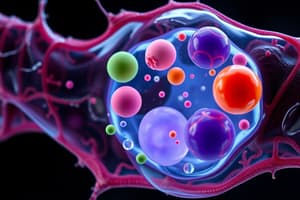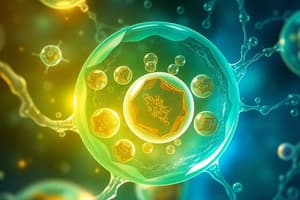Podcast
Questions and Answers
What is the function of the Plasma (cell) Membrane?
What is the function of the Plasma (cell) Membrane?
- Makes ribosomes
- Controls all cell functions
- Produces lipids
- Maintains homeostasis for the cell (correct)
What does the Nucleolus do?
What does the Nucleolus do?
Makes ribosomes
What is the primary function of the Nucleus?
What is the primary function of the Nucleus?
Controls all cell functions
What is the role of ribosomes?
What is the role of ribosomes?
What does the Smooth Endoplasmic Reticulum produce?
What does the Smooth Endoplasmic Reticulum produce?
What is the function of the Rough Endoplasmic Reticulum?
What is the function of the Rough Endoplasmic Reticulum?
What does the Cytoskeleton do?
What does the Cytoskeleton do?
What is the role of the Golgi Apparatus?
What is the role of the Golgi Apparatus?
What do Lysosomes digest?
What do Lysosomes digest?
What is the function of the Nuclear Membrane?
What is the function of the Nuclear Membrane?
What does Cytoplasm do?
What does Cytoplasm do?
What is the role of Centrioles?
What is the role of Centrioles?
What do Chloroplasts do?
What do Chloroplasts do?
What is the function of a Vacuole?
What is the function of a Vacuole?
What is the function of the Cell Wall?
What is the function of the Cell Wall?
What do Mitochondria do?
What do Mitochondria do?
What is an Organelle?
What is an Organelle?
What is a Eukaryotic Cell?
What is a Eukaryotic Cell?
What is a Prokaryotic Cell?
What is a Prokaryotic Cell?
What are Cilia?
What are Cilia?
What is the function of Flagella?
What is the function of Flagella?
What are Microtubules?
What are Microtubules?
What do Peroxisomes contain?
What do Peroxisomes contain?
What is a Vesicle?
What is a Vesicle?
Flashcards
Plasma Membrane
Plasma Membrane
The outer boundary of the cell, controlling what enters and exits, maintaining the cell's internal environment.
Nucleolus
Nucleolus
A structure within the nucleus responsible for producing ribosomes, essential for protein synthesis.
Nucleus
Nucleus
The cell's control center, containing DNA and directing all cellular activities.
Ribosome
Ribosome
Signup and view all the flashcards
Smooth Endoplasmic Reticulum (SER)
Smooth Endoplasmic Reticulum (SER)
Signup and view all the flashcards
Rough Endoplasmic Reticulum (RER)
Rough Endoplasmic Reticulum (RER)
Signup and view all the flashcards
Cytoskeleton
Cytoskeleton
Signup and view all the flashcards
Golgi Apparatus
Golgi Apparatus
Signup and view all the flashcards
Lysosome
Lysosome
Signup and view all the flashcards
Nuclear Membrane
Nuclear Membrane
Signup and view all the flashcards
Cytoplasm
Cytoplasm
Signup and view all the flashcards
Centrioles
Centrioles
Signup and view all the flashcards
Chloroplast
Chloroplast
Signup and view all the flashcards
Vacuole
Vacuole
Signup and view all the flashcards
Cell Wall
Cell Wall
Signup and view all the flashcards
Mitochondria
Mitochondria
Signup and view all the flashcards
Organelle
Organelle
Signup and view all the flashcards
Eukaryotic Cell
Eukaryotic Cell
Signup and view all the flashcards
Prokaryotic Cell
Prokaryotic Cell
Signup and view all the flashcards
Cilia
Cilia
Signup and view all the flashcards
Flagella
Flagella
Signup and view all the flashcards
Microtubules
Microtubules
Signup and view all the flashcards
Peroxisomes
Peroxisomes
Signup and view all the flashcards
Vesicle
Vesicle
Signup and view all the flashcards
Study Notes
Cell Organelles and Their Functions
- Plasma Membrane: Essential for maintaining homeostasis, regulating what enters and exits the cell.
- Nucleolus: Site of ribosome production, crucial for protein synthesis.
- Nucleus: Control center of the cell, governing all cellular functions and activities.
- Ribosome: Synthesize proteins by translating the genetic instructions from DNA.
- Smooth Endoplasmic Reticulum: Involved in lipid production and the detoxification of harmful substances.
- Rough Endoplasmic Reticulum: The surface is studded with ribosomes; key location for protein synthesis and transport between nucleus and cytoplasm.
- Cytoskeleton: Provides structural support, maintaining cell shape and anchoring organelles.
- Golgi Apparatus: Modifies, sorts, and packages proteins for secretion outside the cell.
- Lysosome: Contains enzymes that digest and recycle excess or damaged organelles.
- Nuclear Membrane: Surrounds the nucleus, regulating molecular exchange and providing protection.
- Cytoplasm: Gel-like substance that houses organelles and is the site of numerous biochemical reactions.
- Centrioles: Play a critical role in cell division by facilitating chromosomal separation.
- Chloroplast: Found in plant cells, captures sunlight energy for photosynthesis, converting it into chemical energy.
- Vacuole: Storage unit for nutrients, water, and waste products; larger in plant cells.
- Cell Wall: Provides structural support and protection to plant cells and some bacteria, maintains shape.
- Mitochondria: Powerhouse of the cell, site of cellular respiration where glucose is converted into ATP (usable energy).
- Organelle: Specialized structures within eukaryotic cells that perform distinct cellular functions.
- Eukaryotic Cell: Complex cell type with a membrane-bound nucleus and organelles, found in plants, animals, fungi.
- Prokaryotic Cell: Simpler cell type without a nucleus or membrane-bound organelles, encompasses bacteria and archaea.
- Cilia: Short, hairlike projections aiding in movement and feeding through coordinated beating.
- Flagella: Long, whip-like structure that enables motility in certain cells.
- Microtubules: Component of the cytoskeleton, providing shape and facilitating movement of organelles and structures.
- Peroxisomes: Contain enzymes to break down fatty acids and detoxify harmful compounds, including alcohol and hydrogen peroxide.
- Vesicle: Small membrane-bound sacs involved in transporting molecules within and outside of the cell.
Studying That Suits You
Use AI to generate personalized quizzes and flashcards to suit your learning preferences.




